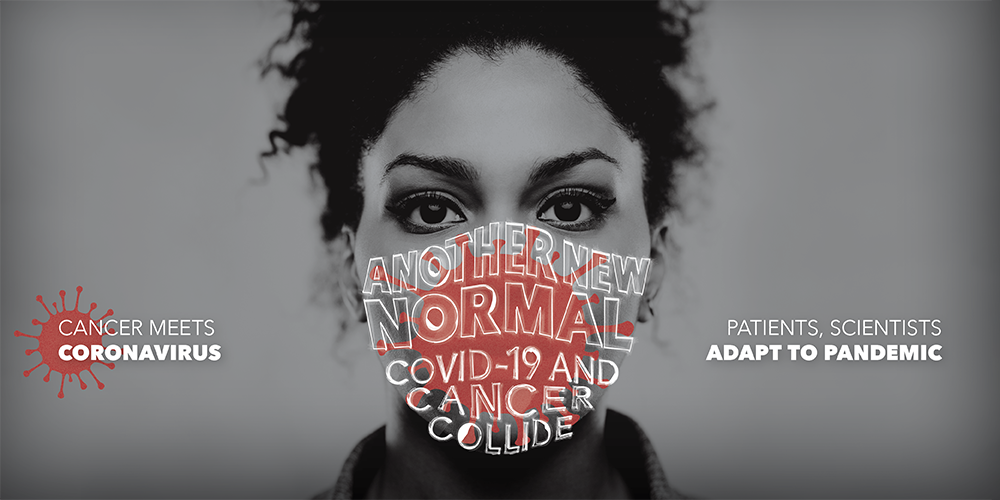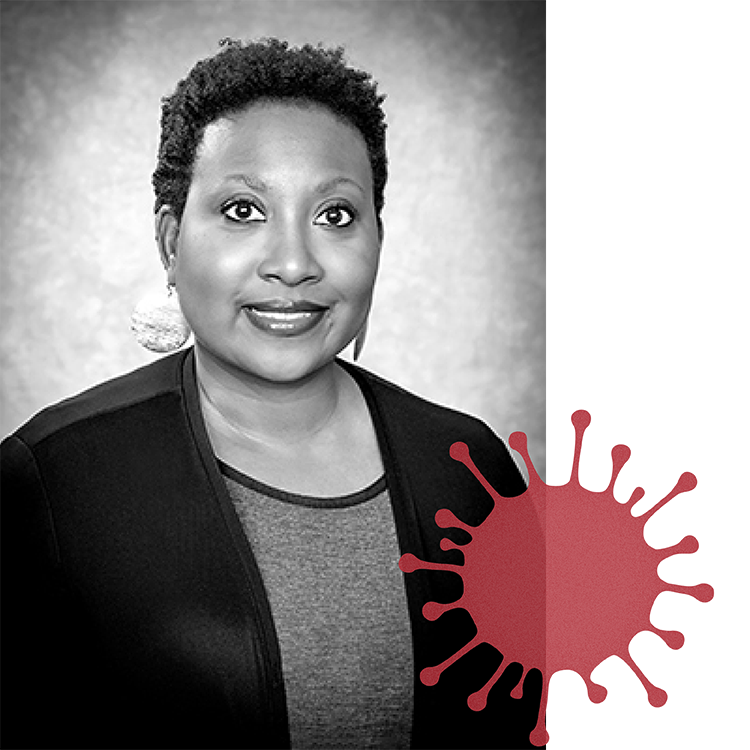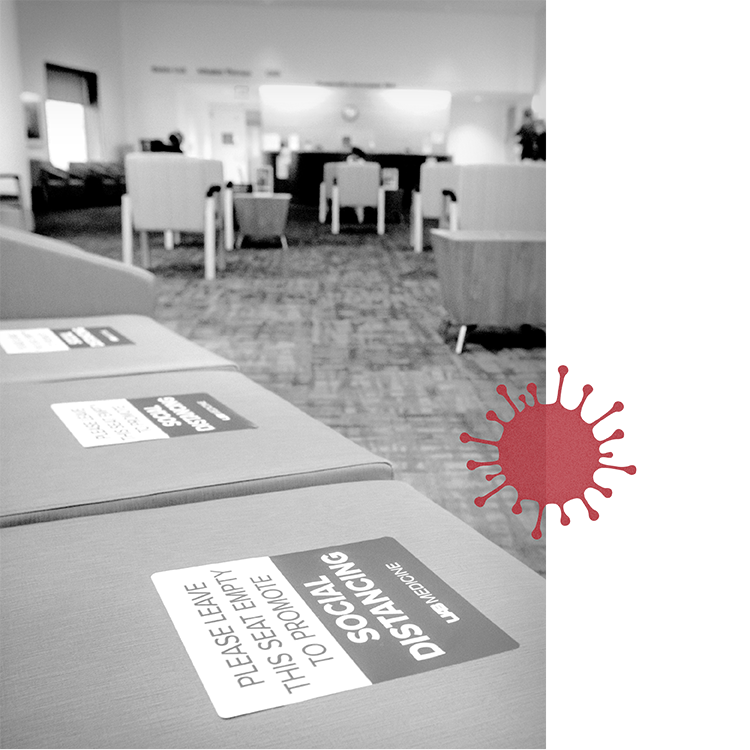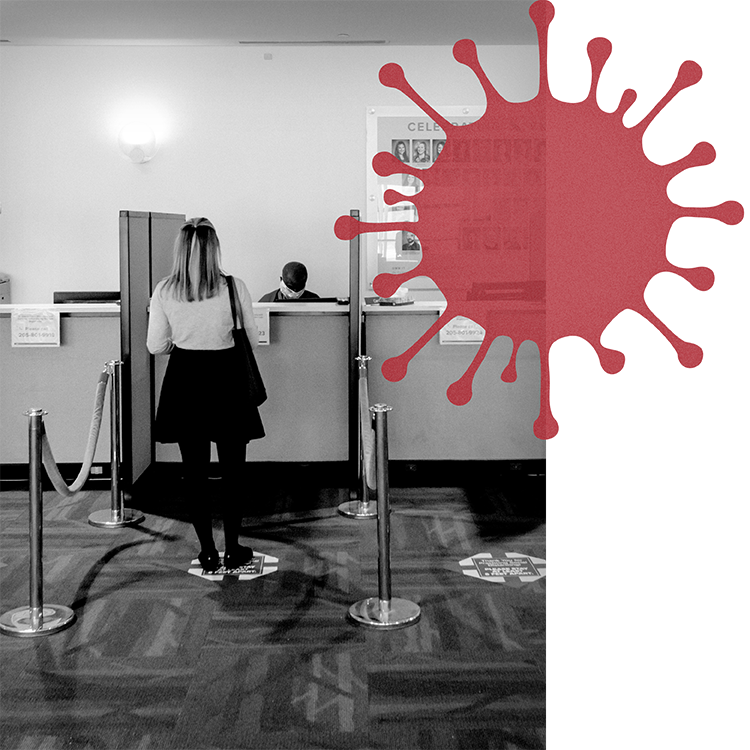Another New Normal
Story by Anna Waters | Photos by Nik Layman and Steve Wood

After fishing her trusty cotton face mask from her bag, Marie Sutton carefully pulled the elastic loops over her ears, adjusting the patterned fabric over her mouth and nose, and pumped a dollop of hand sanitizer onto her palm.
Sutton rubbed the gel between her hands, making sure to cover her fingers and nails, until they both felt dry, and then she slipped her right arm into a compression sleeve.
As she had done more times than she could count, Sutton stepped out of her tan Chevy Tahoe and made her way from the parking deck into The Kirklin Clinic of UAB Hospital. The clinic had become a second home to her before the pandemic began. She could have navigated every floor blindfolded if she wanted, but things had changed.
The check-in kiosks that once lined the walls of the clinic had been replaced with hand sanitizer stations, and a man in a face mask now greeted her from a table near the entrance. The man, a staff member at The Kirklin Clinic, welcomed Sutton as she approached the elevators and asked to check her temperature. After scanning her forehead with a no-contact infrared thermometer, he confirmed she did not have a fever.
The man then handed Sutton a sticker for her to wear during her appointment in order to indicate to the other clinic staff that she had cleared the first hurdle. She applied the sticker to her shirt and checked in with a receptionist who directed her to the waiting room from behind a pane of plexiglass.
Sutton then found a seat between a set of chairs, each of which was occupied solely by a large, green and white sticker that read, “Please leave this seat empty to promote social distancing.” Dozens of other chairs sat empty as well, spread out across the floor like small islands in a sea of brown carpet.
It was not long before the nurse called Sutton back to complete her blood work, which had become a routine part of her life since she was diagnosed with breast cancer on Jan. 19, 2018. Although she was now cancer-free, Sutton still had to visit The Kirklin Clinic for survivorship care, including preparation for a follow-up surgery after her mastectomy on Sept. 19, 2018. The surgery removed 30 of Sutton’s lymphnodes, requiring her to now wear a compression sleeve to protect her right arm.
Sutton works as the director of marketing and communication for the UAB Division of Student Affairs, but she is also a patient at the UAB O’Neal Comprehensive Cancer Center.

“It’s hard enough to try to make sure that I’m adopting the right safety practices so that I won’t have a recurrence,” Sutton said. “But now, on top of that, I have to be careful that I don’t get COVID-19, so it’s just a lot.”
Once her blood work was done, Sutton made her way back to the parking garage, noting a set of additional temperature check tables and the lines of patients forming behind them.
For Sutton, the familiar rituals she’d grown accustomed to during her cancer treatment had changed, now replaced with new rituals to defend against a different enemy.
“Before, I could walk through The Kirklin Clinic with my eyes closed because I was on every floor, every time, every day,” she said. “It was like the ‘Cheers’ bar. Everyone knew my name because I was there all the time.
“Now, everything has changed, including certain entrances and exits. There were chairs facing in opposite directions so you wouldn’t be in the breathing stream of someone else. It was very different, but I believe that they are good changes.”
Sutton admits she was nervous about visiting The Kirklin Clinic during a pandemic, but she trusted her care team at the O’Neal Comprehensive Cancer Center and says she even felt a sense of relief to see the measures that UAB had taken in response to the state’s rising case numbers.
“Leading up to my surgery, I had to go to The Kirklin Clinic a lot. So just knowing that I would be back in that environment, where it was wall-to-wall with sick people, and knowing the potential of getting COVID-19, that was very nerve-wracking,” she said. “But luckily, as soon as I got out of the car, there’s the temperature gun guy, there’s hand sanitizer everywhere, and I’m always booted up with a mask and everything so that I’m protected.”
Cancer never sleeps
For the majority of O’Neal Cancer Center patients like Sutton, who are now facing the threat of COVID-19, care can’t stop, global pandemic or not.
The same is true for many people across the country who receive their cancer diagnoses from routine cancer screenings. Without regular screenings, a lot of these patients might not discover they have cancer until it is too late to effectively treat it.
However, some are now forgoing their treatments and routine cancer screenings out of fear of contracting COVID-19. In an editorial published in Science in June, National Cancer Institute Director Ned Sharpless, M.D., explained that this fear of becoming infected with the virus in a clinic, hospital or other health care setting has discouraged many people from getting treatment and preventive care for diseases other than COVID-19. Models from the NCI also suggest that these delays will result in nearly 10,000 excess deaths from breast and colorectal cancers alone over the next 10 years.
“Even a short-term delay in screening and care can lead to more deaths,” said Barry Sleckman, M.D., Ph.D., director of the O’Neal Comprehensive Cancer Center at UAB. “A missed diagnosis of cancer now can pose a bigger problem later if it progresses to a later stage, leading to a worse prognosis.”
According to the American Cancer Society, the United States has seen a steady decline in cancer deaths over the past 25 years that is generally thought to be caused by a reduction in smoking, advances in cancer treatment and the effectiveness and proliferation of cancer screenings. Because screenings can detect cancer at the beginning of its progression, patients who get screened are able to be diagnosed earlier and, therefore, have the opportunity to begin treatments that can curb, or even cure, their cancer sooner.
Many of these treatments are only available through clinical trials, which offer participants a variety of highly specialized treatments, therapies, drugs, procedures and tests that can go on to become the new standard for cancer care. But Sharpless suggested that the recent pandemic has impeded patients’ access to both screenings and clinical trials, leading to a potential rise in late-stage diagnoses and cancer-related deaths.
Sleckman says that this is why the O’Neal Cancer Center has spent the majority of the pandemic fighting to continue providing patients and the public with safe access to preventive care and cancer treatments, including those that are offered exclusively through clinical trials.
“We have done everything to ensure the safest environment possible for our patients, and we are continuously urging patients to talk to their providers and get the care they need,” Sleckman said. “We realize some cancer treatments can safely be delayed, while others simply cannot.”
Safety first
Sutton’s home is in Birmingham where UAB is only a five-minute drive away, but while visiting The Kirklin Clinic for her cancer treatments, she realized she was often one of the only oncology patients there who lived nearby.
“There are people who come from surrounding states to get their treatment at UAB because UAB has really great cancer care,” she said. “But not everyone along the way, and not every location along the way, is taking the same precautions that UAB takes.”
Sutton says she knows that, for many patients who travel from outside of Alabama to UAB for cancer treatment, the potential risk of exposure to COVID-19 is much higher while they are on the road than it is for those who live nearby, especially if those out-of-state patients have compromised immune systems.
“You are vulnerable until you make it into the arms of UAB,” she said.
According to the American Cancer Society, people with cancer face an elevated risk of developing infections in general, especially those who are receiving treatments that can further weaken their immune systems.
“For example, chemotherapy and radiation therapy are used to kill cancer cells, but they can also kill healthy white blood cells, making some of these patients more vulnerable to infections,” Sleckman said. “So do immunosuppression drugs, which are often given to transplant patients to keep their immune systems from rejecting their new organ, stem cells or bone marrow.”
For these patients, Sleckman says that public health measures, such as social distancing, hand hygiene and, most importantly, universal use of face masks, are the first line of defense against potentially lethal diseases, COVID-19 or otherwise.
“Many of our patients at the O’Neal Cancer Center can have weakened immune systems, and so they can have a harder time fighting off infections,” Sleckman said. “This is one of the reasons why we are taking so many safety precautions in the clinic and the hospital to protect these patients from germs and viruses that can cause things like pneumonia or COVID-19.”
As Sutton noted during her visit to The Kirklin Clinic, UAB Medicine has instated a variety of new policies this year that require and enforce safe social distancing and masking practices for all patients, visitors and employees.

Like Sutton, each of these individuals must complete a temperature check to screen for fever symptoms before entering any campus or clinical building and must wear a face covering while in these spaces, which are disinfected by staff multiple times per day.
UAB Medicine has also implemented strict visitation guidelines for its hospital and clinic locations, limiting the number of visitors who can accompany patients on their visits, and has rearranged all clinic seating so patients and visitors remain at least six feet apart while waiting for their appointments to begin.
Jordan DeMoss, MSHA, the vice president of the UAB Cancer Service Line, says these new policies were established to make clinical spaces safer for patients like Sutton, as well as for families, visitors and staff.
“We believe that, with the right safety protocols in place, we can assure our patients and their families that they are safe to come to UAB for cancer care,” DeMoss said. “Through our intentional efforts, we have created a way for patients to access our care while maintaining patient-centered principles, such as the presence of a compassionate caregiver during their visits, which is critical for a patient undergoing cancer treatment.”
For services that do not require patients to be physically present, UAB Medicine also offers telehealth alternatives that have replaced many in-person visits with virtual ones.
Through UAB eMedicine, patients can easily and securely speak to their care team via a phone or video call initiated by a text message sent to the patient before their scheduled appointment time. Patients also have access to the UAB Medicine patient portal, which allows patients and their care teams to send secure messages to one another, request medication refills and view lab results online.
“One bright spot in the pandemic is that it’s pushed us to support and invest in telemedicine,” Sleckman said. “Because of this, we were able to compress years of infrastructure and systems management into a single month so that, now, telemedicine is a fairly standard method of caring for patients who don’t need an in-person test or physical exam.”
Unmasking the virus
When it comes to how COVID-19 impacts people with cancer, much is still unknown, but researchers at the O’Neal Comprehensive Cancer Center are working to uncover the nature of the virus and its relationship with cancer.
The biggest push in this endeavor comes from the NCI COVID-19 in Cancer Patients Study, or NCCAPS, which is a long-term, natural history study of how COVID-19 and its symptoms develop and change in people with cancer. According to the NCI, the findings from NCCAPS could influence how cancer patients with COVID-19 are treated in the future.
As a natural history study, NCCAPS isn’t testing a new treatment for COVID-19 or cancer but is, instead, collecting information on cancer patients’ medical history, cancer history, cancer treatment, COVID-19 treatment and possible disease management changes in order to learn more about the effects of COVID-19 on people with cancer, as well as the effects of cancer on those with COVID-19.
UAB is one of more than 700 clinical trial sites across the country contributing to this nationwide longitudinal study. Charles A. Leath III, M.D., MSPH, a professor in the UAB Department of Obstetrics & Gynecology and a senior scientist at the O’Neal Cancer Center, is UAB’s principal investigator on the NCCAPS trial.
Leath says he hopes this study will highlight the factors that are associated with the short- and long-term outcomes of COVID-19, such as a patient’s individual characteristics, including pre-existing comorbidities and cancer type and treatment, among others. He also says that COVID-19 and cancer share many comorbidities that could affect the severity or fatality of the disease in cancer patients who are undergoing treatment.
“Increasingly, data suggests a negative consequence for cancer patients receiving active anti-cancer-related therapy, which may be differential based on the specific type of treatment,” Leath said. “In addition, underlying medical problems that impact the cardiovascular or respiratory system – which are often more common in medically underserved individuals, including minorities and those in rural areas – also impact cancer treatments to begin with and, perhaps, accentuate the effects of COVID-19 infections.”
Bearing the burden
People who have cancer face a greater risk of severe illness from COVID-19, according to the Centers for Disease Control and Prevention, but the health disparities associated with either disease are often worse for African Americans and for those living in rural communities, such Alabama’s Black Belt region.
In a paper published in the American Journal of Medicine in May, UAB leaders and researchers discussed the health disparities already present in these populations and how COVID-19 has compounded those problems.
According to the data presented by authors Mona Fouad, M.D., MPH, John Ruffin, Ph.D., and Selwyn Vickers, M.D., African Americans account for 37.5% of lab-confirmed COVID-19 cases in Alabama and 47.4% of all Alabama’s coronavirus deaths, despite the fact that African Americans make up only 26.8% of the state’s total population. Previous research also suggests similar disparities for cancer, especially in the Black Belt region of the state.
However, the O’Neal Comprehensive Cancer Center is fighting to reduce the disparate burden of cancer and the COVID-19 pandemic within these communities.

The O’Neal Cancer Center’s Office of Community Outreach & Engagement recently received $75,000 from the Mike & Gillian Goodrich Foundation to support cancer prevention and awareness efforts in the Black Belt, as well as efforts to address other health disparities exacerbated by the pandemic.
“Although COVID-19 presents unique challenges, such as even more hindered access, we will not be stopped by the current obstacles,” said Monica Baskin, Ph.D., associate director for community outreach and engagement at the Cancer Center. “Instead, we are committed to continuing to develop creative strategies to meet the needs of our medically underserved and vulnerable populations head on.”
One of the priorities of the NCI COVID-19 in Cancer Patients Study is to reach rural, medically underserved and minority populations with these trials, which is a goal shared by the O’Neal Cancer Center and its Office of Community Outreach & Engagement.
Led by Baskin and Associate Director for Globalization and Cancer Isabel Scarinci, Ph.D., MPH, the office’s most recent NCI-supported initiative seeks to determine the impact of the COVID-19 pandemic on the continuum of cancer care, from prevention to survivorship. Through this project, the O’Neal Cancer Center will serve as the coordinating site for a nationwide consortium of 17 cancer centers in the United States. This work will further examine whether differences in demographics impact cancer prevention and control, cancer management, and cancer survivorship during the pandemic.
“Given the urgency and how rapidly the COVID-19 pandemic is evolving, we must take advantage of ongoing collaborative efforts to better understand how COVID-19 has impacted cancer prevention and management and to accelerate implementation of strategies based on the needs and wants of different populations in the U.S.,” Scarinci said.
A new, new normal
Although cancer patients and survivors face a greater risk of infection, especially those with compromised immune systems, Marie Sutton says that the pandemic has allowed others to “step into our world.”
“Now, perhaps, the world knows what it’s like to be a person who feels vulnerable to disease. That’s how I think we all feel every day,” she said. “And now, they realize that we have to do certain things to protect ourselves on a daily basis. We can’t necessarily just go and be free without thinking, acting, protecting.”
Learning all the necessary steps – to put on a mask before getting out of your car, to wash or sanitize your hands after pressing a button in the elevator, or to stand at least six feet apart while waiting in line – can take time.
But for some people who have cancer or have survived cancer, these steps can evolve into new rituals for another new normal. For patients like Sutton, they represent new weapons in a new fight against a new foe, even if they are accompanied by an all-too-familiar sense of vulnerability.
“Being a survivor or someone who has cancer, that’s an additional vulnerability you now have. That’s an additional thing you have to protect yourself from,” she said. “So now it’s just something that’s added to the list.”
Learn more about COVID-19, what UAB is doing to fight it and how you can help.




